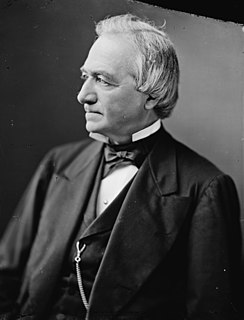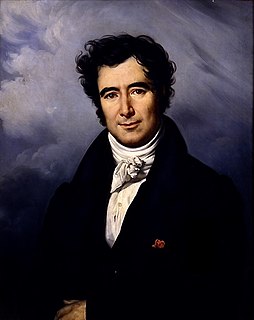A Quote by James Madison
The house of representatives ... can make no law, which will not have its full operation on themselves and their friends, as well as the great mass of society. This has always been deemed one of the strongest bonds by which human policy can connect the rulers and the people together. It creates between them that communion of interest, and sympathy of sentiments, of which few governments have furnished examples; but without which every government degenerates into tyranny.
Quote Topics
Always
Been
Between
Bonds
Communion
Connect
Creates
Deemed
Degenerates
Every
Examples
Few
Friends
Full
Government
Governments
Great
House
House Of Representatives
Human
Interest
Law
Make
Mass
No Law
Operation
People
Policy
Representatives
Rulers
Sentiments
Society
Strongest
Sympathy
Them
Themselves
Together
Tyranny
Well
Which
Will
Without
Related Quotes
There is one view of the subject which ought to have its influence on those who espouse doctrines which strike at the authoritative origin and efficacious operation of the Government of the United States. The Government of the U.S. like all Governments free in their principles, rests on compact; a compact, not between the Government & the parties who formed & live under it; but among the parties themselves, and the strongest of Governments are those in which the compacts were most fairly formed and most faithfully executed.
MORAL LAW, Evidence of.- Man has been subjected by his Creator to the moral law, of which his feelings, or conscience as it is sometimes called, are the evidence with which his Creator has furnished him. ... The moral duties which exist between individual and individual in a state of nature, accompany them into a state of society ... their Maker not having released them from those duties on their forming themselves into a nation.
If it be asked what is to restrain the House of Representatives from making legal discriminations in favor of themselves and a particular class of the society? I answer, the genius of the whole system, the nature of just and constitutional laws, and above all the vigilant and manly spirit which actuates the people of America, a spirit which nourishes freedom, and in return is nourished by it. If this spirit shall ever be so far debased as to tolerate a law not obligatory on the Legislature as well as on the people, the people will be prepared to tolerate anything but liberty.
Great part of that order which reigns among mankind is not the effect of government. It has its origin in the principles of society and the natural constitution of man. It existed prior to government, and would exist if the formality of government was abolished. The mutual dependence and reciprocal interest which man has upon man, and all the parts of civilised community upon each other, create that great chain of connection which holds it together.
Governments do not make ideals, but ideals make governments. This is both historically and logically true. Of course the government can help to sustain ideals and can create institutions through which they can be the better observed, but their source by their very nature is in the people. The people have to bear their own responsibilities. There is no method by which that burden can be shifted to the government. It is not the enactment, but the observance of laws, that creates the character of a nation.
I heartily accept the motto, "That government is best which governs least"; and I should like to see it acted up to more rapidly and systematically. Carried out, it finally amounts to this, which also I believe — "That government is best which governs not at all"; and when men are prepared for it, that will be the kind of government which they will have. Government is at best but an expedient; but most governments are usually, and all governments are sometimes, inexpedient.
The preservation of a free government requires not merely that the metes and bounds which separate each department of power be invariably maintained; but more especially that neither of them be suffered to overleap the great Barrier which defends the rights of the people. The Rulers who are guilty of such an encroachment, exceed the commission from which they derive their authority and are Tyrants. The people who submit to it are governed by laws made neither by themselves nor by an authority derived from them, and are slaves.
The society of Christendom and especially of Western Christendom up to the explosion, which we call the Reformation, had been a society of owners: a Proprietarial Society. It was one in which there remained strong bonds between one class and another, and in which there was a hierarchy of superior and inferior, but not, in the main, a distinction between a restricted body of possessors and a main body of destitute at the mercy of the possessors, such as our society has become.
The state governments have a full superintendence and control over the immense mass of local interests of their respective states, which connect themselves with the feelings, the affections, the municipal institutions, and the internal arrangements of the whole population. They possess, too, the immediate administration of justice in all cases, civil and criminal, which concern the property, personal rights, and peaceful pursuits of their own citizens.
The true forms of government, therefore, are those in which the one, or the few, or the many, govern with a view to the common interest; but governments which rule with a view to the private interest, whether of the one or of the few, or of the many, are perversions. For the members of a state, if they are truly citizens, ought to participate in its advantages.
A time will come when the science of destruction shall bend before the arts of peace; when the genius which multiplies our powers, which creates new products, which diffuses comfort and happiness among the great mass of the people, shall occupy in the general estimation of mankind that rank which reason and common sense now assign to it.
It is necessary for every American, with becoming energy to endeavor to stop the dissemination of principles evidently destructive of the cause for which they have bled. It must be the combined virtue of the rulers and of the people to do this, and to rescue and save their civil and religious rights from the outstretched arm of tyranny, which may appear under any mode or form of government.






























